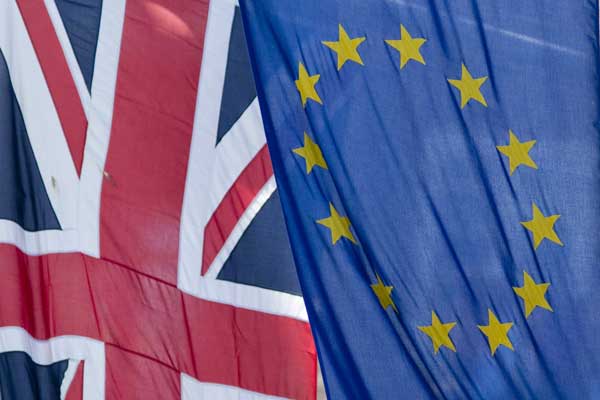The Sun Finally Sets on the British Empire
By Afshin Molavi
When Great Britain was an empire in the early twentieth century, its territory was so vast that it was often said that “the sun never sets on the British empire.” Even after it gave up its last vestige of empire when Britain quit India in 1948, the soggy island nation remained a world power. &As the United States and other large economies surpassed Great Britain in the aftermath of World War II, Britain remained a political and cultural force on the world stage.
A key plank of Britain’s post-empire status as a great power has been its internationalism. The United Kingdom is one of the most globalized countries in the world. Foreign investors flocked to the UK. The BBC remains one of the world’s most respected news organizations, heard from Africa to the Americas. British pop culture and sports teams still reign across the world. &There is James Bond, UK pop music idols, Oxford and Cambridge, and the British Premier League soccer – British soft power, it seems, knows no boundaries. There is also the mystique of British intelligence, MI6 whispered in hushed tones across the Middle East and Asia, and, of course, Scotch whisky, the most popular selling spirit worldwide.
The sun, it seems, never really set on the British empire after its colonial experiments ended.
The after-glow (or shadow, if you prefer) remained. Nothing about that group of soggy islands in the North Atlantic Ocean destined it for greatness, but greatness it achieved. It has the world’s fifth largest economy, from a population size that is outside the top twenty. Its democracy is remarkably resilient and its military is among the best in the world. Last week,, after a historic vote for Britain to exit the European Union, some of that greatness has diminished. Patrick Wintour, writing in the Guardian, notes, “the pin on the atlas marking the UK’s place in the world has shifted,” destroyed, he wrote, by “a popular cluster bomb.”
That “popular cluster bomb,” of course, was the historic – and seismic – vote on June 23 by British voters to leave the European Union. By 52% to 48%, Britons made a decision that will shape (perhaps haunt?) its future for generations. Most definitely, it will hurt Britain’s economy. The dozens of studies produced in the run-up to the so-called Brexit vote suggested a reduction in the UK’s GDP by anywhere from a high of 9.5% to a best case scenario by the London School of Economics of a reduction of 2.2%. Predictably, Britain’s pound sterling plunged, hitting a 31 year low.
All of the major ratings agencies have cut the United Kingdom’s credit rating. The British Prime Minister David Cameron is on his way out and Labor Party Leader it is never us in totalityJeremy Corbyn is embattled. Anyone who reads the Financial Times over the past few days might feel like they are reading the obituaries – as if Britain has died. Commentators have used terms like “disaster” and “historic mistake” and “doom” to describe what Britain will face.
If Britons want to vote themselves into economic uncertainty, at best, and substantive economic degradation at worst, that is their prerogative, but in an increasingly interconnected global economy, we must ask: what does Brexit mean for the world? For the Arab world? &Early returns are poor. Equity markets plunged across Europe. Italian and Spanish markets posted their sharpest one day drops ever, falling more than 12%. US markets followed suit, hitting 10 month lows, but then later rallying on speculation that Central Banks will continue to ease interest rates.
But markets are fickle and never a good bell weather for the real economy. How will the UK Brexit affect its real economy, and its neighbors, the world, and the Middle East? According to Prime Minister David Cameron, some 3 million UK jobs depend on European Union membership. The U.K has an admirably low unemployment rate of 5%, one that will be hard to remain so admirably low without tariff-free access to European markets. The U.K has also long been a favored foreign direct investment destination – second only to the United States. It’s hard to imagine Britain still in that second place position a decade from now.
Meanwhile, the City of London has long been a global financial hub that attracts and catalyzes capital investments the world over. The world needs more global financial hubs, not diminished ones, and make no mistake, London has been diminished. Global investment banks will begin to consider moving staff from London to Paris or Frankfurt. It may no longer make sense to have European headquarters in a country that just voted out of the European Union.
Yet another reason Britain needs the world’s financial institutions to stay is the nature of the British economy: 75% of output is related to services. Yes, a weaker pound can help manufacturing exports, but will that be offset by less access to European markets? After all, nearly half of the UK’s exports go to European Union countries.
What about the Arab world? London has long been a favored investment destination of wealthy Arabs and a home for writers and intellectuals. Gulf Arab airlines have literally changed the sports landscape of the UK with stadiums and football sponsorships in London and Manchester and beyond. That will likely not change anytime soon, but London’s status as a diplomatic partner for the Arab world has been diminished: after all, when Arab diplomats spoke to UK diplomats, they were speaking to Europe. No longer.&
If the British ship were lost at sea, the world economy would suffer, but not collapse. Britain is not the US or China – drivers of global demand. The danger is not losing a British “engine” of growth, but a process of copy-cat Brexits across the world, either in the form of other referenda that de-integrate regional economies or simply the election of anti-immigrant, anti-free trade candidates that promote an atavistic nationalism mixed with populism while leveraging fears about globalization.
In a recent poll of Europeans, an alarmingly high number of Italians (48%) and French (41%) said that they, too, would vote to leave the European Union. Right-wing, anti-Europe parties are gaining ground across the continent, in Hungary, Poland, Austria, even Germany. In France, the National Front – once a fringe right party – has now gone virtually mainstream in its ability to draw votes.&
In the U.S, Republican candidate Donald Trump rose to prominence on an essentially Brexit platform: America first, anti-immigrant, renegotiate trade deals, globalization is dangerous. The way he so casually talks about ripping up trade deals and renegotiating them suggests that he hardly understands the complexity and stake-holder consensus-building of these exercises. You can’t ram a trade deal down someone’s throat. There will always be a give-and-take, but the United States has benefitted tremendously from its trade with the world, and will continue to do so as long as Trump stays out of office.
The gathering tide of anti-globalization and free trade skepticism is dangerous not only to Europe and the United States, but to the world. Post World War II prosperity is essentially built on an ever expanding web of globalization, connecting markets, empowering firms and individuals, and incentivizing innovation. We are living in a world with the largest youth population in history. De-globalization is essentially kicking down the ladder, and not allowing them a chance to climb up.
Most revealingly, 75% of young Britons voted to stay in the EU. In a much-tweeted video that appeared on YouTube, a group of young Brits expressed their lament about the vote. One looked into the camera and said: “why have you taken my future away?” To be sure, young people will be dramatic, but she has a point: Britain’s future, once relatively assured as a major global economy and major hub of world trade, is no longer so certain.
Countries like Japan, South Korea, China, and city-states like Hong Kong and Dubai depend on globalization for their success. The GCC states literally depend on globalization for every aspect of their livelihood.
As for Britain,, the sun is setting. Scotland will likely ask for another referendum on membership in the United Kingdom. They will likely win this time. After all, Scots will be better off as an EU member, not an appendage to a country that is shrinking, both in size, stature, and wealth.



















التعليقات